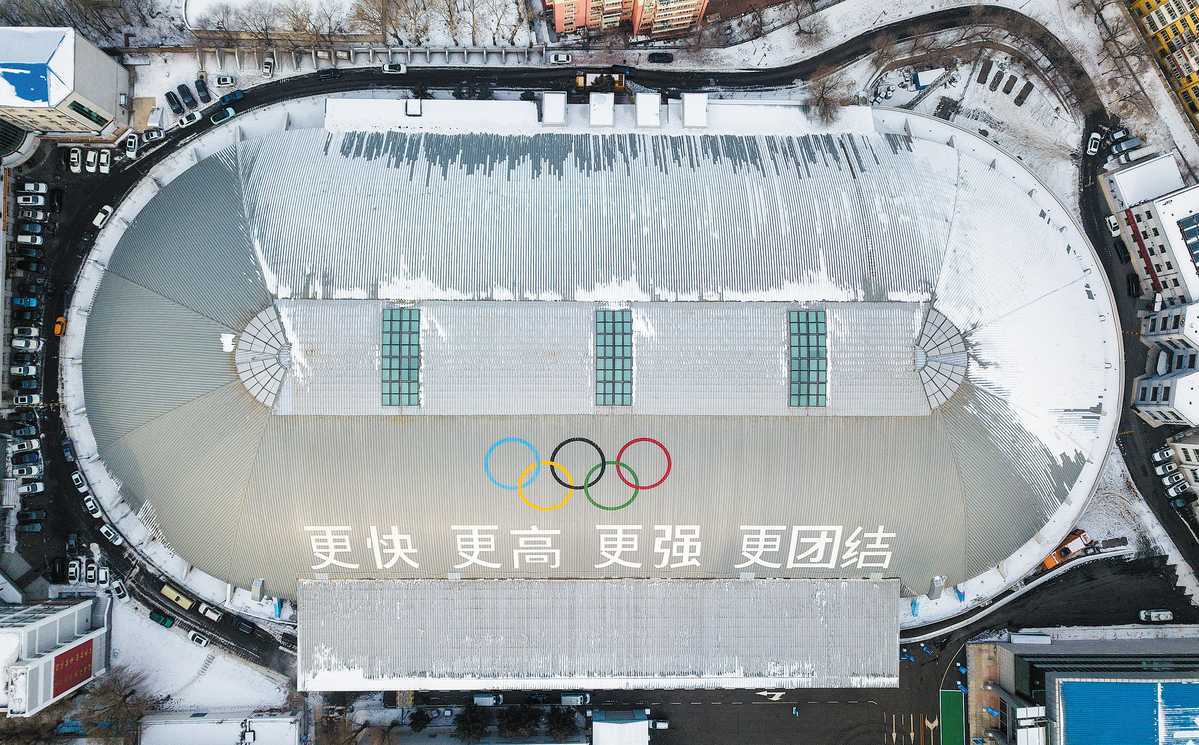
The Asian Winter Games have taken a considered, "site-specific" approach to venue upgrades, opting against large-scale demolitions and reconstructions. XINHUA
They may be small in numbers, but some emerging delegations from Asia's hottest or driest regions are huge in ambition, and they're raring to make their presence felt on the ice and snow in Harbin, Heilongjiang province.
Take the Philippines, for example, which just won a mixed doubles round-robin match against South Korea in early competition of the 9th Asian Winter Games in Harbin.
Few, if any, would have picked curling debutants Kathleen Dubberstein and Marc Pfister over the top-ranked South Korean duo of 2018 Olympic silver medalist Kim Kyung-ae and teammate Seong Ji-hoon.
However, Dubberstein and Pfister proved the pundits wrong on Tuesday in Harbin by upsetting the title favorites 12-6 on the first day of the Asian Winter Games' curling tournament, kicking off a three-win streak in Group B, until their first loss to host China on Wednesday.
Due to their lengthy competition schedules, ice hockey and curling got their round-robin stages underway days before the Games' official opening ceremony on Friday. The Games will run through Feb 14.
Representing a national program that was established just two years ago, the Philippine duo took pride in turning heads in Harbin, and they minced no words about their ambitions.
"If we can get a medal for the Philippines, that would be great," said Dubberstein, who will lead the Philippine delegation into the opening ceremony as its flag bearer, alongside short-track speed skater Peter Groseclose.
"But we are a new team, so we will work on our team dynamics and shot-making to improve our performance," Dubberstein added.
Like many tropical nations, the Philippines is embracing ice-based sports, particularly curling, in a bid to establish itself in winter sports. Half of the country's 20 athletes in Harbin are curlers.
Jarryd Bello, secretary-general of Curling Pilipinas, told the Philippine Daily Inquirer, "We are definitely the underdog team here, but our athletes are here to compete and they are proud to represent the country."
With more countries and regions from Southeast and West Asia joining in, the Harbin edition of the Winter Asiad, which features a record number of 34 participating delegations, has witnessed the expansion of winter sports in Asia.
Cambodia and Saudi Arabia are both making their Games debut in Harbin, while more than 10 countries and regions from Asia's usually snowless areas, including Thailand and Kuwait, will be competing in a wider range of sports than at previous Games.
Thailand, a continental power in summer events, such as soccer, badminton and golf, is committed to promoting winter sports as well, in a bid to help diversify its leisure and tourism sector, said Yuthaya Cheenheet, director of the Elite Sports Development Department of the Sports Authority of Thailand.
"We are a hot country; we don't have snow and we don't have a winter sports training center yet. But we need to develop our winter sports to try and catch up with international standards," Cheenheet said at Beijing Capital International Airport on Wednesday before boarding a flight to Harbin.
"I totally agree that it's a good move to expand winter sports, particularly ice events at indoor facilities, to some tropical countries as well, because it's helpful for developing an economy around sports and tourism," he added.
A record number of 87 Thai athletes have signed up to compete in six sports at Harbin 2025, with some set to make surprising appearances in altitude events such as ski mountaineering and alpine skiing.
Cambodia's debut Winter Asiad campaign, featuring four teen snowboarders set to compete in the men's half-pipe, is expected to send home an encouraging message, no matter where their athletes land in the high-flying discipline, said Vath Chamroeun, secretary-general of the National Olympic Committee of Cambodia.
"This is the first time for Cambodia, as a tropical and hot country, to have a team participate at the Asian Winter Games," Chamroeun told Xinhua News Agency. The country's participation reflects the vision of the International Olympic Committee to encourage more countries and regions that have hot weather, or are without snow and ice, to participate in winter sports, he added.
With the next Asian Winter Games to be held in Saudi Arabia in 2029 at Trojena, a resort situated in the heart of the country's northwestern mountain regions, interest in promoting winter sports and related tourism businesses has been piqued across the Gulf nations.
Kuwait is one of the ambitious newcomers from West Asia that is determined to make some noise in Harbin with a 65-strong contingent of athletes.
"Our participation in Harbin will be Kuwait's largest since our debut in 1999," said Fahid Al-Ajmi, head of the Kuwaiti delegation. Kuwaiti teams have undergone rigorous preparation at domestic as well as international training camps, and they will compete hard to make their presence felt in Harbin, Al-Ajmi added.
Jasem Al-Awadhi, the captain of Kuwait's ice hockey team and a three-time Asian Winter Games veteran, said, "We are determined to secure victories and elevate Kuwait's standing, building on our thorough preparation."
sunxiaochen@chinadaily.com.cn